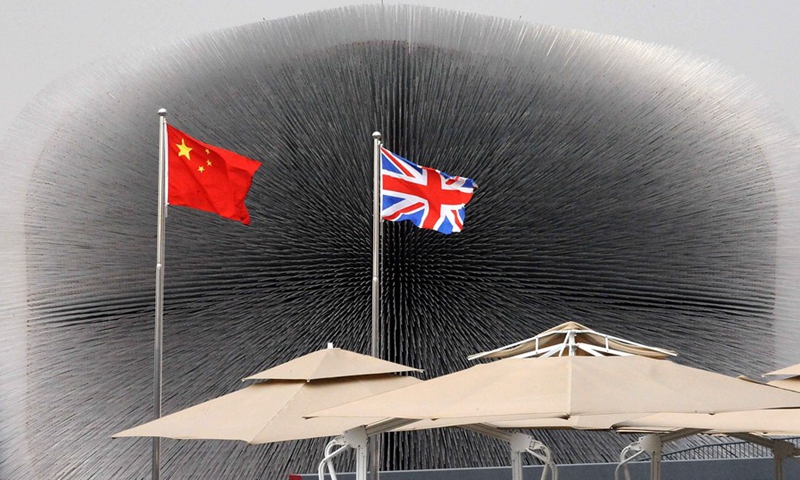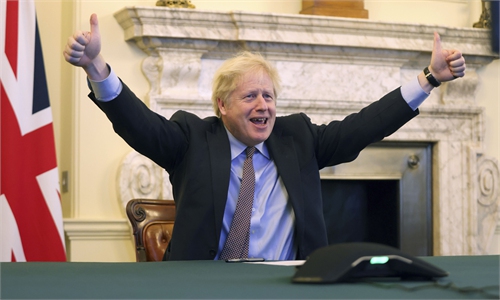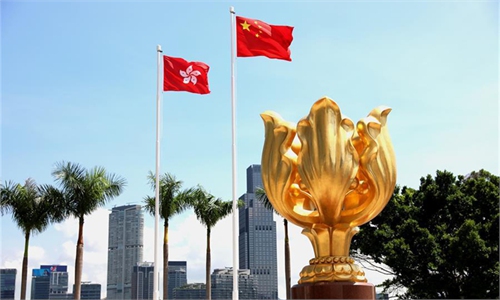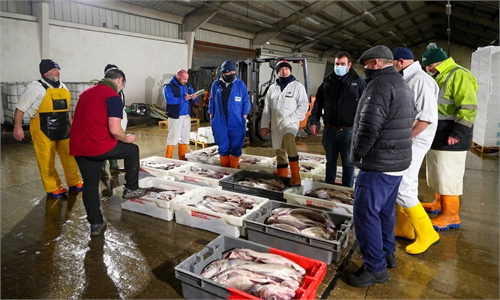COMMENTS / EXPERT ASSESSMENT
UK playing old trick of setting trade barriers under guise of 'labor issue'

National flags of China and Britain are seen in front of the UK pavilion in the World Expo Park in Shanghai, East China, April 23, 2010. File Photo: Xinhua
One was introduced by Raymond Collins from the House of Lords, with the intention of limiting the signing of trade deals with countries that "violating human rights". The other clause trying to prohibit trade with countries that "commit acts of genocide" was proposed by David Alton who has repeatedly accused China, without evidence, of "committing genocide".
In an atmosphere where some British anti-China politicians and media outlets keep playing up the so-called Xinjiang issue of China, these two clauses are believed to be "response measures" toward the concocted rumors about China's Xinjiang Uygur Autonomous Region, aiming to obstruct any free trade deal between London and Beijing.
It is a traditional political "skill" of the UK to setup trade barriers under the guise of labor issues, to hold down challenges abroad and to squash political opponents at home simultaneously. Both proposers of the above two amendment clauses are not new to anti-China topics. During debates in the UK House of Lords, Collins has talked about China-related issues around 40 times, most of which occurred after 2018.
Apart from the occasional platitudes about the Hong Kong Special Administrative Region, Collins' claims are mostly about "forced labor" in China, which is nothing more than standing on the so-called "human rights" high ground with a roundly rejection of "forced labor" produced goods.
Alton is also a frequenter in raising anti-China topics, constantly focusing on slandering China with various cooked-up topics, while showing barely any interest on the war in Afghanistan or the Iraq War, which the UK has been deeply involved in.
As politicians from different parties, why do they find common ground on "China topics", especially the so-called force labor issue? Do they really care about the welfare of the Uygur people or the overall Chinese people? Absolutely not. Besides the intention to challenge the current Conservative Party government, their core purpose is to protect the interests of the parties.
Since the 19th century, the labor issue, especially the "morality" of the labor source, has become an important tool for British imperialism to compete with other countries for global trade hegemony. After slavery was abolished in the UK in 1838, the new advocators of free-trade capitalism started to seek cheap labor elsewhere, and large numbers of Chinese laborers became the main resources for capital accumulation in that era of "free trade".
Those Chinese labors transported to the US, Australia or South Africa were treated no better than slaves. While the abolition of slavery has been converted as moral bottom line in Western political discourse, anti-China has been repeatedly used as a tool for certain ill-intended politicians to exchange political interest, which clearly shows the hypocrisy of the moral discourse of capitalist politics.
The current show of using labor issues as a disguise to setup barriers so as to protect national hegemony or even vested interest of departments was also used in the early 20th century in the UK. In 1903, the UK Conservative government came under fire for the extensive use of Chinese laborers in the South African colonies after the Boer War. However, after the opposition took over office, the accusation about Chinese labor in South Africa disappeared and the new administration maintained the policy of using cheap labor. After the "democracy" drama, the ruling party of the nation altered while the only thing remaining unchanged was the plight of the laborers and profitability of capitalists.
Eight so-called civilized countries forced China's Qing government to sign an unequal treaty in 1901. Now 120 years later, the anti-China drama is still on, and the total groundlessness does not prevent those British anti-China politicians from playing up the forced labor topic.
However, it must be noted that although the anti-China voices in the UK are loud, they are still in the minority. Those who are committed to China-UK friendship and cooperation are making constant efforts, such as the London-based 48 Group Club formed 68 years ago with far-sighted personage in the British business community committing to promoting trade between China and the UK. Such spirit of "ice breakers" is especially worth revisiting today.
The article was compiled based on a commentary written by Yin Zhiguang, an associate professor in the University of Exeter, and a visiting professor in Shanghai International Studies University. bizopinion@globaltimes.com.cn



